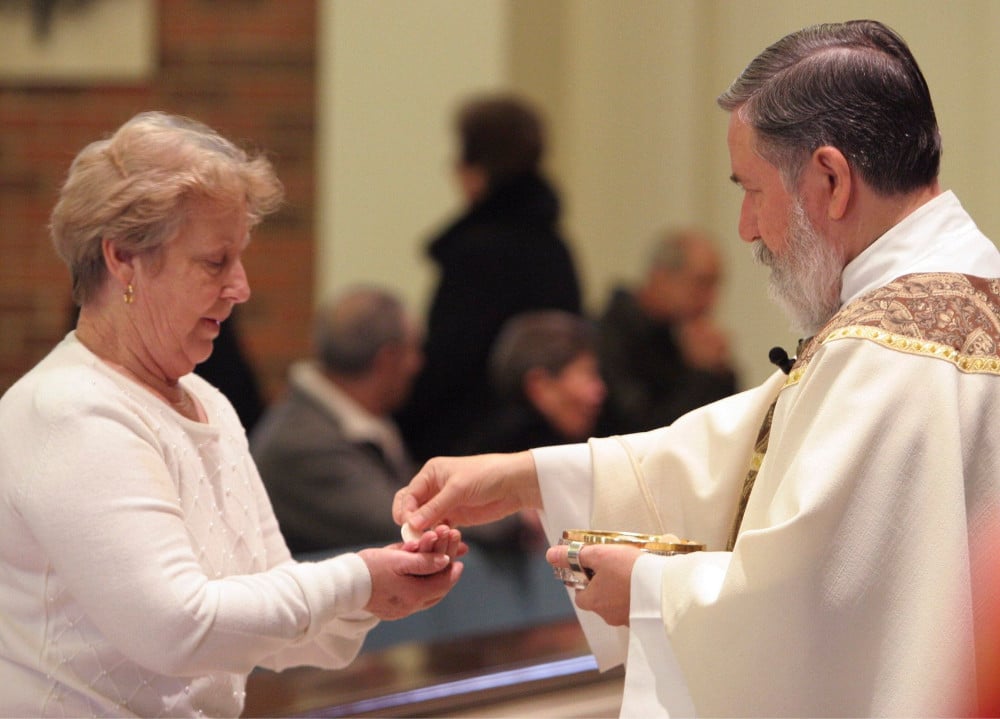 Question: One of our seminarians was told by the rector that the reception of holy Communion in the hand is the norm set down in the United States and that it is “only by concession to receive on the tongue.” Therefore, he wants the seminarians to receive in the hand. He was told that it was a lack of Eucharistic theology that leads people to receive on the tongue. It is my understanding that a person can either receive on the tongue or in the hand. This is where I am looking for clarification.
Question: One of our seminarians was told by the rector that the reception of holy Communion in the hand is the norm set down in the United States and that it is “only by concession to receive on the tongue.” Therefore, he wants the seminarians to receive in the hand. He was told that it was a lack of Eucharistic theology that leads people to receive on the tongue. It is my understanding that a person can either receive on the tongue or in the hand. This is where I am looking for clarification.
— Name, location withheld
Answer: The view of the seminary rector, as stated, is backwards. It is Communion on the tongue that is normative and Communion in the hand that is granted by concession or permission. The General Instruction of the Roman Missal says, “If Communion is given only under the species of bread, the priest raises the host slightly and shows it to each, saying, “The Body of Christ.” The communicant replies, “Amen,” and receives the sacrament either on the tongue or, where this is allowed, in the hand, the choice lying with the communicant” (No. 161).
Hence, two things are to be noted. First, reception in the hand is what is by concession, not reception on the tongue, which is normative. Second, where a choice is permitted, it is up to the communicant, not the celebrant. No celebrant, rector or otherwise, should pressure or mandate communicants to receive in the hand, as is being done here.
The rector’s further remark that Communion on the tongue indicates a lack of proper Eucharistic theology is out of line and also ambiguous. How are such views flawed? Some through the years have made this claim in other ways, such as to say that Communion in the hand is a sign of spiritual maturity, or that Communion on the tongue reduces the lay faithful to infancy. But 99% of the Church’s greatest saints never got this memo and never realized that they were infantile by receiving in this manner. Further, the Eastern Churches who administer the Eucharist under both species only on the tongue are seemingly unaware that they have a lack of “proper Eucharistic theology.”
Hence, the views of the rector, if accurate as reported, significantly misrepresent the Church’s disciplinary practice as to the reception of holy Communion. Further, these views seem based on a sort of self-referential appeal to a notion that any views contrary to his are “flawed” in some vague sense only he knows. One can only hope that a priest who has the task of the formation of future clergy will accept correction in this matter.
Title of Mary
Question: I recently heard the Litany of Loreto being prayed. One of the salutations to Our Lady is “Mother of our Creator.” I understand that Mary is the Mother of God, as she is the Mother of Jesus — true man and true God — but I don’t understand this phrase, as I thought that God the Father is our Creator?
— Name, location withheld
Answer: There are complex issues here that were largely dealt with at the Council of Ephesus. Both Trinitarian theology and the theology of the Incarnation are at play. The Council of Ephesus defined Mary as “Mother of God,” despite the objection of a few theologians who argued that she was the Mother of Jesus in terms of his human nature but not his divine nature. However, the Council Fathers concluded that Jesus is one person with two natures. And because of this, Mary is rightfully called the Mother of God, since Jesus is God.
By way of an imperfect analogy, we would not call our mother the mother only of our body but not of our soul. We are one, a union of body and soul, and we do not divide ourselves up in that way. So our mother is our mother, even if she does not supply our spiritual nature, per se, but rather our physical nature, she is still our Mother.
A further trinitarian norm is that every external act of the Trinity is an act of the whole Trinity. Thus, while we usually ascribe creation to the Father, Scripture also says of Jesus: “For in him were created all things in heaven and on earth … all things were created through him and for him” (Col 1:16). So, the Father creates all things through his Son, the Word. And in this sense, we can speak of Mary as the Mother of our Creator. God the Father creates us through his Son.
Msgr. Charles Pope is the pastor of Holy Comforter-St. Cyprian in Washington, D.C., and writes for the Archdiocese of Washington, D.C. at blog.adw.org. Send questions to msgrpope@osv.com.







